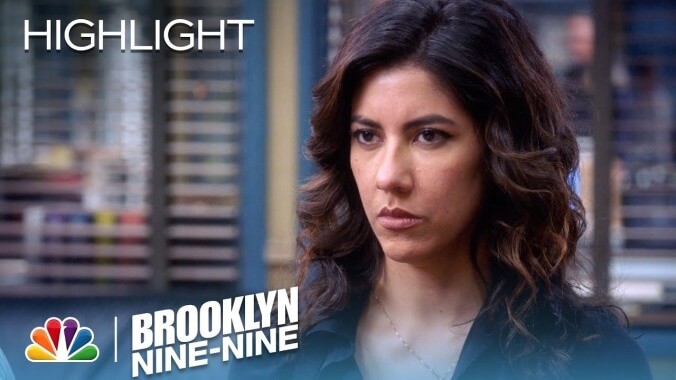Jake and Charles get some Best Bud time as Ike Barinholtz swings by the Nine-Nine

“Adoption is complicated,” Charles tells Jake late in “Gintars,” a solid, if not dazzling, episode of Brooklyn Nine-Nine that gets better on examination. And he’s right—for many families, it is. But “Gintars” doesn’t attempt to dissect or explain the ins and outs of Nikolaj’s connection with the titular weirdo, or to pass judgment on Charles’ reaction to Gintars’ arrival. Instead, it focuses on other relationships, even the gentlest of which can be pretty damn complicated, too.
The A-story this week centers on the newest members of the Salt Lake Lindas, Boyle and Jake, whose relationship is thrown off balance when the latter gets too involved in a complicated Boyle family matter (and not in a fun, “let’s take a couples trip” with Boyle and his dad kind of way). The episode, credited to Andy Gosche, pulls a clever bait and switch, seemingly focusing in on the machinations of Gintars (Ike Barinholtz, in full Barinholtz mode), when in reality the dramatic thrust is that of Best Bud #1 and Best Bud #1. The moment in which that clicks into place instantly casts the rest of the episode in a different light.
There’s scene after scene of Charles talking about his feelings, and about the worries and insecurities that the arrival of Gintars stirs up. (“Nikolaj.” “Nikolaj!” “Nikolaj.” “Nikolaj!” “Nikolaj.” “Nikolaj!”) Jake, always action-oriented, proposes solutions and finds new ways of framing the issues for Boyle, but after hearing Boyle say he’d do anything to get rid of Gintars, he forgets a really important part of being Best Bud #1, and instead begins plotting to get the guy sent back to Latvia. It’s then that Charles, who the story most concerns, has his big revelation—and it happens off-screen. It’s a private thing, a family thing, but Jake might still have learned about it, if he’d decided to comfort his friend instead of heading to the Russian Baths.
Before Charles’ off-screen revelation, it’s a lightweight but entertaining Charles/Jake story, albeit one that gives Joe Lo Truglio plenty to play. Afterward, with the story re-framed with that one line, it becomes a significant milestone in one of the show’s most significant relationships. Jake is wrong—nothing new. Charles calls him out on it, and not in the usual, worshipful and forgiving Boyle way. He’s mad, and he takes Jake to task—harshly, by Boyle standards, gently by almost anyone else.

 Keep scrolling for more great stories.
Keep scrolling for more great stories.